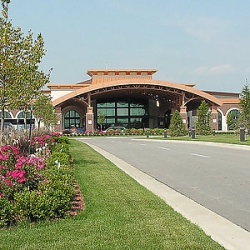
Riverside Casino Opposed the Cedar Rapids Proposals
Updating a previous report, The Iowa Racing and Gaming Commission rejected a proposed $164 million casino planned for Cedar Rapids. After reviewing the proposals, the commission at a Thursday meeting decided the new casino would hurt the business of existing ones. Jeff Lamberti, Carl Heinrich, Kris Kramer, and Rich Arnold voted against the Cedar Rapids project. Dolores Mertz was the lone commissioner in favor of the project.
Representatives of the casino operations in Dubuque, Waterloo, and Riverside had fought the development of the Cedar Crossing Casino. These gaming interests claimed it would cannibalize business. Thursday’s decision included a 4-1 vote against Cedar Rapids with 300 people watching on. The Gaming Commission has no appeals process, so their vote appears to have ended any hopes the city would receive a gaming venue.
Cedar Rapids Proposal
The people of Cedar Rapids have been lobbying for the casino project for 3 years. Pep rallies were held, and the city voted 61% to 39% in favor of the proposition. When Cedar Rapids officials discussed the project with state officials, they said the casino would provide an economic boost for Cedar Rapids and the region surrounding it.
The development would have been in the area ravaged by the 2008 flood. Supporters of the Cedar Crossing Casinos said the new gaming location would have brought tax revenues to the state, county, and city. It also would have created thousands of jobs, and helped local charities still coping with the recession and the aftermath of the flood.
Commission Members Described Cedar Rapids as Top Notch
The five-member commission praised the Cedar Rapids plans as “top-notch”. In many ways, the high quality of the proposed casino might have worked against it, because its opponents could argue that such a nice casino would take gamblers away from their older and less enticing gaming establishments.
Dan Kehl, CEO of the Riverside Casino, said he might have to lay off 250 of his 750 employees, if the commission approved the new construction project. He said the Cedar Crossing Casino would have taken away 30% of his establishment’s business.
2013 Study Found a Saturated Iowa Market
Council members cited a study they commissioned in 2013 which suggested that Iowa’s gambling market was saturated. In a state with 3.1 million people and 20-plus casinos, the existing operators were able to convince officials that the market was dangerously crowded.
If the Cedar Rapids Casino was built, they argued it would necessitate layoffs at their casinos and hurt their charitable money donations to nonprofit groups. One previous study suggested the millions that might go into the Cedar Crossing Casino development should instead be reinvested into existing licensed casinos.
The commission says its vote was consistent with recent policies. The committee has not approved a new casino project since 2010. At the time, the commission called for a 3-to-5 year moratorium on any new building, due to market saturation concerns.
Both Sides Cite the Market System
The member of the commission who voted for the Cedar Rapids casino, Dolores Mertz of Algona, said she thought Iowa’s casino gambling industry should be market driven. She said she did not want to put anyone out of business, but if a better business was in the making, established interests should not stand in the way.
The Gaming and Racing Commission’s Chairman, Jeff Lamberti, also cited the free market system, but claimed his decision was supporting that system, by providing a “stable and predictable gaming environment” in the state of Iowa.
Cedar Rapids Mayor Says They Did Everything Asked of Them
When Cedar Rapids Mayor Ron Corbett expressed disappointment at the announcement, he stated the Iowa gaming market had grown “stagnant“. Mayor Corbett suggested the established gaming interests wanted to do nothing to improve their product, but instead chose to freeze out competition and watch the profits roll in.
Corbett also said that the Gaming and Racing Commission came to Cedar Rapids leaders about putting together the proposal. He said that his city found investors, secured financing, bought a site for the casino, and procured a management group. This cost the city “millions and millions“. Every step of the way, he believes his city did what it was asked, so he was at a loss to explain the commission’s decision.
